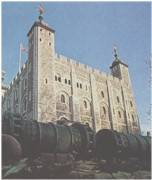 |
The Bayeaux tapestry shows how the
military might of the Normans defeated Harolds exhausted
army. Once established as king, William I continued in
the vein of might being right |
| The Tower of London was built with the
express aim of showing the inhabitants of London who was
in charge now. William continued with a demonic round of
castle building across the whole country. The uniqueness
of the Norman conquest in British history is that not
only did the ruler change, but also the whole of the
ruling class changes, and there was even a new language.
The English nobility lost their lands, and the new
landowners built castles like Warwick and Windsor that
survive to this day. By the time William died in 1087
around 100 major castles had been built |
 |
 |
The other major legacy of
William's reign is the Domesday Book. William
wished to know the existing and potential value
of his new kingdom. Surveyors were sent out
across the whole country and their report was the
massive Domesday Book which noted land down to
individual landholdings |
|
|
|
The other Norman Kings, William II,
Stephen, Henry I and Henry II were no pussycats, but they
had little efffect on posterity until Henry II ascended
to the throne in 1154 |
 |
Remember that William I had been
duke of Normandy as well as King of England (map
left). Henry II expanded this empire, as he
wasDuke of Aquitaine (right) though his wife's
title. England was there a major player on
Continental Europe, and continued to hold parts
of France for 500 years until Calais was finally
lost in 1558 |
|
 |
.
 |
Henry II is known for his
ordering the murder of the Archbishop Of
Cantabury, Thomas Becket, in Cantabury Cathedral
- stabbed at the high alter in 1170. (shown in
the medieval manuscript on the right. It did not
do to cross the king |
|
 |






